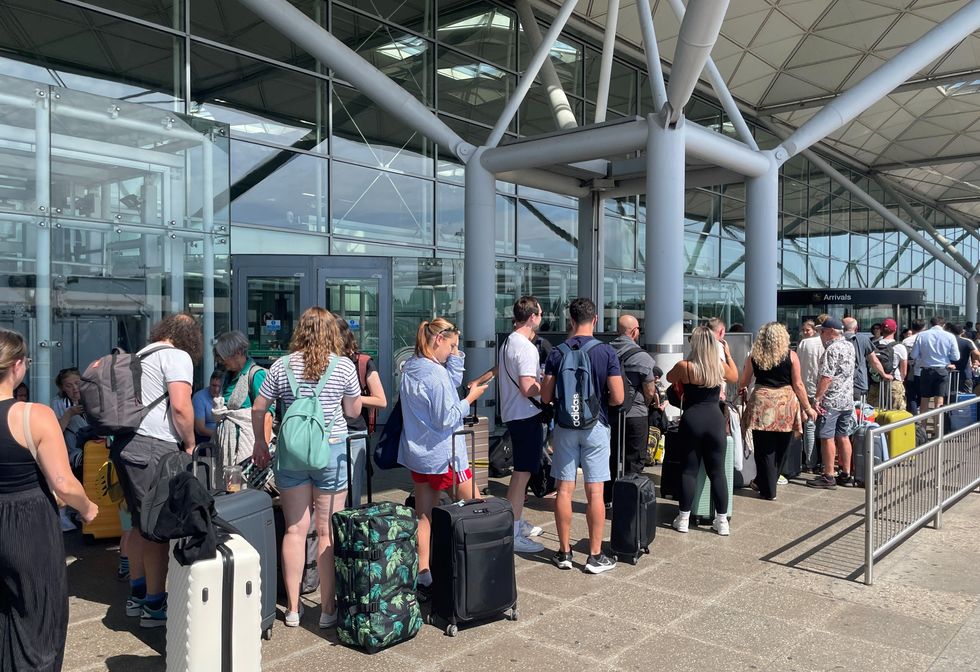People have been hit by travel disruption and payment problems due to the IT outage
GETTY | PA
An IT outage has sparked payment problems, travel chaos and GP appointment disruption, sparking fears about whether the world is over-reliant on technology
Don't Miss
Most Read
A global IT outage has caused major disruption, knocking airlines, banks and train companies offline.
NHS England said it is causing disruption in “the majority of GP practices” in England, with surgeries reporting they’re unable to access patient records or book appointments. There is currently no known impact on 999 or emergency services.
Pharmacies have also reported issues with accessing prescriptions, affecting the delivery of medicines to patients, while banks, supermarkets and other major institutions have reported disruption around the world. Many businesses have not been able to take digital payments.
With more and more people across the world becoming reliant on technology for essential services, GB News asked technology experts just how prepared we are, in the UK and globally, for mass IT outages.
According to Iain James, computer systems manager, at care management software provider Fusion eCare Solutions, the incident underscores the “urgent need” for diversification and resilience in our “technological backbone”.He said it also serves as a “wake-up call” for the technology industry to reassess security protocols.
"This incident starkly highlights our global dependence on IT infrastructure and exposes the vulnerabilities inherent in relying on a handful of major tech corporations,” James said.
“The reverberations of this event will be felt far and wide, prompting a deeper examination of how we safeguard our digital world.”

Airlines have had to ground flights due to the global IT outage
PA
Trevor Dearing, Director of Critical Infrastructure at Illumio, said the outage is an example of “how reliant we now are” on the internet, and why more needs to be done to “strengthen the resilience of our critical national infrastructure”.
He warned many organisations don’t have a risk-based approach to cybersecurity, creating a “huge risk”.
Dearing said: “If a simple bug can cause mayhem, then consider what a concerted cyberattack could have.
“It’s only a matter of time before we see a catastrophic attack on our critical infrastructure, yet many organisations still have not adopted a risk-based approach to cybersecurity, which means they don’t necessarily understand where the vulnerabilities are.
“This presents a huge risk at a time of geopolitical uncertainty.”
Alan Stephenson-Brown, CEO of Evolve, a senior international telecommunication, network security, and payments specialist, echoed this sentiment, warning today’s global IT outage is a “timely reminder that operational resilience should be at the forefront of the business agenda”.
He said the problems demonstrate that even large corporations aren’t immune to IT troubles, and urged business leaders to take a serious look at their systems.
“This outage highlights the importance of having distributed data centres and rerouting connectivity that ensures business can continue functioning when cloud infrastructure is disrupted,” Stephenson-Brown said.
“By prioritising both contingency planning and preventative measures, IT systems can be protected.
“I urge business leaders to seriously appraise the systems they have in place to identify potential vulnerabilities before they find themselves the subject of the next IT outages headline."
While smartphones and contactless payments are forms of technology we are very familiar with, other uses of tech aren't quite as visible in our day to day lives.
For instance, the use of smart technology in managing buildings could cause chaos, if there were to be problems with the IT.
Simon Harris, the CEO of the large facilities management company Avrenim, expressed concerns about companies"pushing AI" in certain installations given today's outage.
He said there needs to be vital cyber checks and assessments if smart technology were to be used in critical infrastructure.
"If you think about the chaos today, and transpose that into a critical build environment like a hospital, which we manage, then you've got the potential capability there to take a hospital out. That makes it really scary," he warned.
London Stock Exchange (LSE) updates were among the financial services affected by the outage today.
The LSE said securities trading was unaffected by the outage, but its regulatory news service was not working this morning.
A spokesperson said: “We are currently experiencing a third party technical issue which is impacting some of our services.
“There is no impact to securities trading on the London Stock Exchange. We are working on resolving this issue as soon as possible and will continue to provide updates to our customers.”
MORE FROM GBN MEMBERSHIP:
In a statement, Microsoft said a resolution for Windows devices was “forthcoming”.
It said: “We are aware of an issue affecting Windows devices due to an update from a third party software platform. We anticipate a resolution is forthcoming.”
Dan Coatsworth, investment analyst at AJ Bell said countless industries face disruption to earnings if people cannot do their job.
He said: “Workers cannot get from A to B and that will have a knock-on effect for industries across the board if staff aren’t there to perform important functions or systems are offline."
Coatsworth said the severity will boil down to how long the outage lasts.
"Prolonged disruption is another matter, potentially causing damage to companies and economies," he added.
“Stock markets continued to function as normal despite corporate news feeds and information terminals being impacted by the tech outage.
“Futures prices imply a small pullback when Wall Street opens later today, but so far investors have not shown any panic. Whether that remains the case as the day goes on is another matter.”













